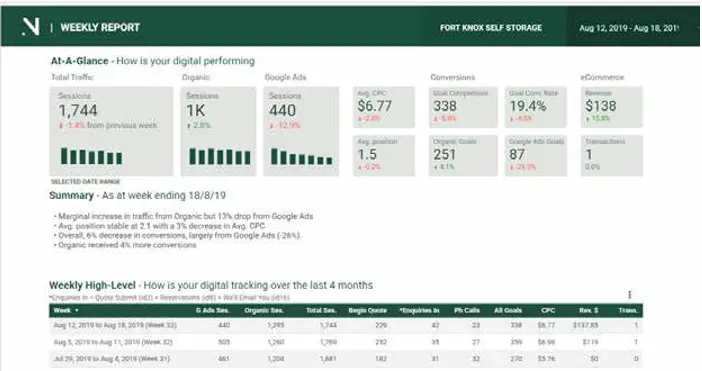In our digital age, understanding and leveraging data-driven insights is the key to achieving digital marketing success. Join us as we delve into the dynamic world of digital marketing metrics, tracking, reporting, and analytics. Whether you’re a seasoned marketing professional or just dipping your toes into the vast sea of analytics, this blog will equip you with the knowledge and strategies you need to navigate this ever-evolving landscape. So, let’s harness the power of data and transform your marketing efforts for the better!
Step 1: Digital Marketing Reporting
By this stage, you should already have your Analytics Framework built, so you will have access to accurate marketing reports and dashboards that provide you with all the info that answers all the mysterious questions of what’s working well and where things are failing.
We generally recommend four stages of reporting:
- Daily – Two or three high-level metrics that tell you how yesterday went and any major alarm bells. You might look at Total Visitors, Leads and Sales for example.
- Weekly – Taking it to the next level, you want to look at approximately 5-7 core metrics that tell you how well last week went and if there is anything urgent that you need to address or change course.
- Monthly – Once again drilling down to the detail, you want to look at all campaigns, all channels, all components of these campaigns and how well they have performed.
- Quarterly – Detailed review of the whole quarter across all major touchpoints.
The numbers provide the clarity that tells us how well everything is (or isn’t) working.

Step 2: Digital Marketing Analysis
Once you have the reports, you need to deep dive into the data to explore a few core concepts:
- Green lights: What’s working well and how can you do more of it?
- Orange lights: What’s mediocre and how do you fix/improve?
- Red lights: What’s performing terribly, and do you need to get rid of it?
- Insight: Digital marketing is all about how you improve things. It’s not about how you create things. If you want digital marketing to get you 5,000% increases in the short-term, you’re barking up the wrong tree – that’s a red light.
Step 3: Recommendations
Once you know what’s working and not working, you can then work on how to get better results from your marketing campaign, such as:
- Shift budget to things that are converting well.
- Stop doing campaigns that aren’t producing the required outcomes.
- Improve messaging and content for mediocre campaigns.
- Improve landing pages as they aren’t converting as well.
Step 4: Digital Marketing Strategy, Plan & Execution
Once you know what you are going to do, you need to add it into the marketing system so that the outcome is improved results:
- What exactly needs to be done?
- Who is going to do it?
- When is it going to be done by?
- How are you going to report on it to make sure it works?
Step 5: Repeat
Then repeat the whole process!
Unlock Digital Marketing Success By Leveraging Your Data & Metrics
In conclusion, mastering metrics, tracking, reporting, and analytics is more than a skill—it’s a strategic advantage. By understanding your data, you gain the ability to fine-tune your digital marketing efforts, make informed decisions, and drive superior results. Whether you’re optimising campaigns, improving user experiences, or identifying untapped opportunities, data is your compass in the digital marketing landscape. As technology and marketing continue to evolve, staying ahead of the curve means not only adapting but thriving in this data-driven world.






